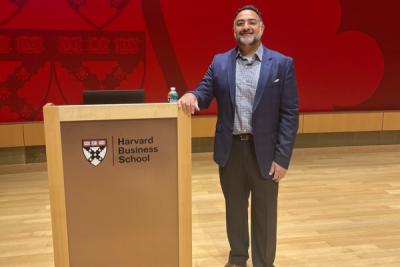
This month, Kapil Vashistha, senior vice president at DaVita, joined Harvard’s Health Care Club Conference to speak about collaboration across both established and emerging health care organizations.
During the discussion, Vashistha engaged with a cross-specialty group of leaders from Memorial Hermann Health System, Pearl Health, Optum, Hopscotch Health, Humana and Flare Capital Partnerships to explore how the health care community can work together in alignment with the conference theme, “Charting the Changing Tides: Unpacking Healthcare’s Pressing Challenges and Identifying Lasting Solutions.”
While on campus, we caught up with Vashistha to hear more:
Why did you choose to work at DaVita after business school?
Vashistha: Prior to DaVita, I had worked in biotech and as meaningful and purposeful as that was, it didn’t give me the proximity to patient care that I wanted. And so my first visit to DaVita, where I actually realized I was going to get an opportunity to have personal relationships with the patients in my centers. This was just very moving emotionally and fulfilling.
It’s a part of why I wanted to be a campus ambassador to connect and tell our story at my alma mater, Harvard Business school. In general, it gives me energy to share examples of our culture and show people that they can have genuine impact on the lives of others.
What would you say DaVita is looking for when collaborating with the larger health care community?
Vashistha: We focus on the patient first. And as we think about the evolution of where our patient's needs are, we‘re deciding if we want to build these capabilities in house or if we want to go out and join forces with somebody. Conversations like this panel are opportunities to hear how others are engaging in health care evolution. And there were a lot of similarities between the larger health care ecosystem and how people are coming together in this decade than I think prior ones around how we can take advantage of our unique capabilities and bring them together for the benefit of the patient.
As we think about who we're collaborating with, we're a values-based organization. We live “the DaVita Way,” every day in our interactions with our patients and our teammates. We look for organizations that are similarly minded around what they're trying to accomplish on behalf of either the patient, our teammates or our physician partners. And finding like-minded, like-valued organizations to collaborate with is really what we try to do.
Value-based care is top of mind for so many in health care today. Can you share insight into DaVita's value-based care strategy?
Vashistha: We see a big need to figure out population management at scale and how to lower the overall total cost of care for the betterment of patients and tax payers. Something I shared with the panel is that the reason why myself and others have run to the fire in kidney care is because this is exactly where the healt hcare system is most needed to come together. If you consider access to care, our patients are predominantly elderly, and a lot of Black and Hispanic patients that may not have the right access to care.
Kidney patients have complex needs and are often very sick: On average, our patients are seeing four plus providers at any given time. So, it requires a lot of care coordination and the ability to provide the right care and services for individual needs — to do right by our patients. Our unique value proposition is that we are highly engaged with our patients and our physician partners in a way that positions us well to care for this population with wrap-around support.
How is DaVita addressing challenges to advance care delivery for patients?
Vashistha: One of the biggest challenges with upstream patients, and I would say healthier patients in general, is access to care. So many people are not seeing their physicians, and it decreases the likelihood of an early diagnoses or intervention with health concerns. One of the questions we have to solve for is, how do you engage patients that don't normally interact with the health care system early enough? It requires a lot of talent and capabilities around risk stratification, outreach and education. And I think that's some of the most exciting stuff that we're embarking on over the next 10 years.
What would you share as the biggest takeaway from the panel today?
Vashistha: One of my biggest takeaways from the panel, and I think the overall conference, is that health care is evolving to a point where people are much more open to collaborating and acknowledging the capabilities that exist and complement each other to help advance how we care for patients.
Health care is so dynamic — and I would say, more so now than it has ever been. The health care community is navigating new care models, new economic models, new technology as well as the ever present need to deliver high-quality care for patients.
So, it is a very fun and a challenging time. And if you have a lot of energy to want to go solve something, it's going to have dramatic impact on the lives of others. Health care is definitely the place to be.









